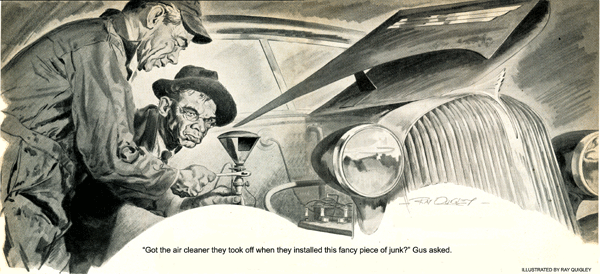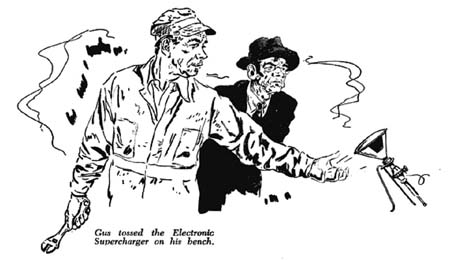May 1948
GUS PROVES ECONOMY EXPENSIVE
by Martin Bunn
Air and atoms may power cars some day,
but skinflint Silas Barnstable discovers to his sorrow
that the present models still need gasoline.

Stan Hicks came into the Model Garage shop looking as if he had topped off his hunch with a glassful of vinegar. "That man," he announced, is here again!"
Gus Wilson looked up from the valve he was grinding. "What man?" he demanded.
"Silas Barnstable," Stan said. "Old Mister Pinchpenny himself. He hasn't been around here for six months -- not since he squawked that we were robbing him because we billed him three-fifty for a four-buck job!"
Gus grinned. For some inexplicable reason he has a tolerant liking for the old retired farmer who has -- and richly deserves -- the reputation of being the tightest and most cantankerous man in town. "There's one thing in Sila's favor -- he's always good for a laugh," he said. "But what's he up to? Why doesn't he come in?"
Stan took a look out of the window. "He's doing something to his car," he reported. "Got the hood up, and is listening to the engine... Here he comes now."
Silas strutted in. As usual his manner was that of a bantam rooster challenging the world, but under it, Gus felt, he wasn't altogether at ease.
"Mornin', Gus!" he cackled. "By jiminy, I ain't seen you in a dog's age! Got a trouble-shootin; job for you -- provided you be a leetle reasonable about what you charge for it. Old friendship's old friendship, I allus say, and I'm willing to give you another chance."
"Which means," Gus said with pretended coldness, "that you've tight-wadded yourself into a mess you want me to get you out of. Well, that's all right with me, but you'll get charged the same as anybody else -- no less and no more. That being understood, what's the matter with your car?"
"Derned if I know what's the matter with it," Silas grumbled. "It don't run the way it ought to, that's all I know. But it can't be anything serious -- nothing that ought to cost much to fix."
"There's one way to find out. Drive it in," Silas drove his car into the shop and got out, leaving its engine idling -- which it did with considerable missing. "Now jest listen to that," he complained. She starts harder'n cold molasses and then does a lot of coughin' and sputterin'".
"Maybe it's the cut-rate gas you get down at that joint you do business with," Stan suggested.
Silas glared at him. Then he turned back to Gus. "I thought maybe you would have made some improvements around here since the last time I was in," he said. "Such as firin' that nitwit grease monkey, for instance . . . There's nothing the matter with this gas I've got in it today -- I bought it at that big service station across from the Post Office, and they charged me plenty for it."
"Well," Gus decided, "if there isn't something screwy with your ignition, the engine is being starved for fuel, and since you're using decent gas for a change, the fuel line must be partly clogged, or the carburetor is out of adjustment. I'll check -- "
"No you don't!" Silas howled. "You ain't going to waste time monkeying around with the ignition or the gas line or the carburetor. Not if I've got to pay for it! They've all been gone over by a good mechanic, and he didn't find anything wrong!"
Gus gave him a straight look. "I'll do this job my way or not at all," he said tartly. "Take your choice!"
Stan's snicker didn't make it any easier for Silas to give in, but after half a minute of grumbling he told Gus to go ahead "your own fool way."
Grinning, Gus got into the car and pressed his foot down on the accelerator pedal. As the engine speeded up the missing got worse, and it began to cough and backfire in the carburetor.
He pulled the choke part way out. The missing and backfiring stopped, and when he eased the engine back to idling speed it continued to run smoothly.
Gus switched off the ignition and got out. "Your trouble," he told Silas, "is that the mixture is too lean -- not enough gasoline or too much air. You haven't been fooling with your carburetor, have you?"
"Never even tetched it!" Silas disclaimed.
"If you haven't changed the carburetor adjustment," Gus grunted doubtfully, "the needle-valve or the float must have got out of kilter. Or maybe there's an air leak in the intake manifold!"
Gus raised the hood. He leaned over to examine the carburetor, but immediately straightened up with an expression of deep disgust on his face. "What the dickens is that?" he demanded, pointing to an oddly-shaped tin can where the air cleaner should have been.
"Newest thing out!" the owner said proudly. "Feller that sold it to me called it the Save-Gas Electronic Supercharger. It's a fuel economizer, that's what it is. And it's cut down my fuel bills, by heck! Not so much as the feller claimed it would, but enough so it'll soon have paid for itself. After that it'll be a real money saver for me.
"I got a leetle laid by for a rainy day, but I ain't one to waste when I can save!"
"I'll say you're not!" Gus agreed with real feeling. "How long have you had this do-funny on your car?"
"Bout a month," Silas told him.
"And how long has your engine been missing and coughing and starting hard?"
"Well," Silas admitted slowly, "bout the same length of time, I guess."
"For a man with your head for figures, you add things up awful slow," Gus said, tapping the fuel economizer not too gently with a wrench. "That's the cause of your trouble, and I'll prove it to you. Got the air cleaner they took off when they installed this fancy piece of junk?"
"Yep -- it's in the back of the car."
Gus disconnected the Save-Gas Electronic Supercharger, and tossed it contemptuously on his workbench. Then he reinstalled the air cleaner. "Now listen," he said, and got into the car.
The engine took off at a mere touch of the starter switch. When he stepped on the accelerator it speeded up smoothly, without missing or backfiring, and with the choke in. When he eased the pressure on the pedal it idled quietly and steadily.
Gus got out. "Convinced?" he asked.
The old fellow was red in the face and his faded blue eyes were blazing. "I've been cheated!" he howled. "If they won't give me my money back for that danged contraption I'll stand 'em a suit -- I will, by heck!"
"You've been stuck all right," Gus agreed unsympathetically, "but you can't do anything about it. You've got to admit that the Save-Gas Electronic Supercharger -- which isn't either electronic or a supercharger -- did just what the salesman claimed it would do. It reduced the amount of gas you used." He picked up the funnel-like contrivance, looked it over carefully, and handed it to Silas.
"You see how it saves gas, don't you? The opening of the can is toward the font of the car, so extra air flows into the carburetor. That leans the fuel mixture, and saves gas -- just what the salesman said -- so you can't claim that he misrepresented it. He just forgot to mention what the saving would cost in terms of performance."
"I'll get even," Silas snarled. "Those dirty cheats not only stuck me with this thing -- they charged me for a trouble-shootin' job! If they don't make good I'll have the law on 'em!"
After Silas had gone on his way, still breathing fire and vowing vengeance, Stan turned to Gus. "Say, boss," he asked, "are all the fuel economizers as useless as that one old Pinchpenny got stuck with?"
"I wouldn't want to say that," Gus hedged, "because maybe I haven't seen them all. But I will say that I've never seen one that would do anything a simple carburetor adjustment wouldn't do as well or better. And the engineers at the Bureau of Standards down in Washington, who have tested a lot of 'em, say the same thing.
"Mind you, I'm only speaking of economizers, not performance improvers of the hot-rod, short-manifold type. These can sometimes make a sluggish engine wake up, while gas savers do just the opposite.
"This economizer is one of the better ones," he went on after he had fired up his pipe. "At least it makes good on its promise to reduce gas consumption. But unless the buyer's carburetor has been adjusted to give too rich a mixture, it does it by cutting engine performance.
"Most gas-saving gadgets work on the principle of adding more air to the carburetor mixture. If the carburetor has been set to give an unnecessarily rich mixture, an economizer will cut fuel consumption without spoiling engine performance by leaning down the too-rich mixture to normal. But carburetor adjustment will do that just as well, and cheaper. If the carburetor gives a normal mixture, an economizer will still reduce gas consumption, but the extra air makes the mixture so lean the engine'll buck and cough. If you don't mind poor pick-up and a little sluggishness, you can save just as much gas by installing a 'lean' jet on the carburetor."
"And go limping off at every light? Not me!" declared Stan.
"The average car owner, who's more interested in good performance than in squeezing the last possible foot out of each gallon of gas," said Gus, you should stick to normal carburetor adjustment. That'll feed a rich mixture when needed and save maximum power, and a leaner mixture when the engine doesn't work so hard.
"Most fuel economizers work on the air-adding principle, but a few have been developed which try to do the fuel-saving job in a different way. They don't spoil performance, but they don't save gas either. One that I had a chance to look at used an electric spark. It was supposed to make ozone to boost power, but the amount of ozone it produced was so small it couldn't be measured -- which was lucky because ozone in quantity is a swell knock inducer!"
Stan nodded thoughtfully, "I guess it all boils down to this -- you get what you pay for."
Gus stared at his assistant with mock surprise, "Once in a long while," he said, "you amaze me by being sensible!"
END
L. Osbone 2019
